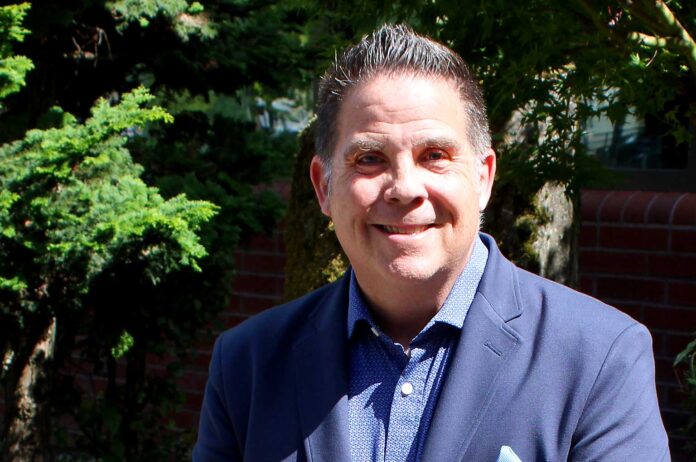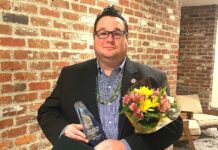
Chatting with Tigard’s new City Manager Brent Stockwell, who just started on the job June 1, you would think he was a long-time city resident. He rattles off the names of parks he has walked or biked to, including Summerlake City Park, Cook Family Park, Dirksen Nature Park and Bonita Park, and he has learned Symposium on Main Street is a great place to meet people for coffee.
On the job, he has been meeting with local residents, getting to know city staff, and getting acquainted with other city managers in the area while looking for opportunities to work together, and he has been learning about regional partners, including the Metro Council, Tualatin Valley Fire & Rescue and Clean Water Services.
“I’ve met local business people, I’ve been to the food pods at Universal Plaza, I went to the Leadership Tigard graduation at Broadway Rose,” Stockwell said. “I’ve been to community events like the Juneteenth celebration, I walked in the Tigard-Tualatin School District’s Pride parade, and I attended the Fourth of July drone show.”
Choosing a career path
Raised in Lawrence, Kan., Stockwell said he was interested in public administration because “I grew up in a great community. It had a great local government. Two of my neighbors on the street were the public works director, Mr. George Williams, who had an immaculately kept lawn and a street named after him, and Mr. Woody, who worked with youth and had a park named after his family.”
By the time Stockwell graduated from Kansas State University, he knew he wanted to work in city administration. “I was naturally driven to social studies and found public administration,” he said. “In my senior year, I surveyed local business leaders on their attitudes on economic development and a traffic-waiver issue. I was interesting to me how community issues got resolved.
“I was looking for a really good public affairs school in an area where I wanted to live that was different from Kansas. Our intention was to stay in that area.”
The answer was the Pacific Northwest, where Stockwell earned a master’s degree in public administration from the University of Washington (and also completed the Harvard Kennedy School Senior Executives in State and Local Government Program). “I did a city management internship in Federal Way when this city of 75,000 was only three years old,” he said. “They were doing everything from the ground up. They wanted to do local government different and be creative.”
After Stockwell found a way to save the city hundreds of thousands of dollars on a program, “I remember the city attorney jumped up and down,” he said.
Early career opportunities
At that time, in February 1993, Boeing announced layoffs resulting in the loss of up to 19,000 jobs in the state, which had a ripple effect in the economy, making it hard to find a job. “At the time, my in-laws were retiring to Arizona and said we could stay with them while we looked for jobs,” Stockwell said.
He ended up staying in Arizona for more than 30 years, working for the state, a local non-profit and the City of Mesa before two-plus decades at the City of Scottsdale, including a decade as assistant city manager.
“I’m a big believer in getting the residents informed with what’s going on so they can collaborate with you,” Stockwell said. “Typically, in Scottsdale I would be asked to solve tough problems and engage with the community. One project I was asked to work on was short-term rentals (which previously were unregulated). I put together a working group of 12 community members and business owners, and we met six times over 12 weeks to develop a series of recommendations and came to a consensus. Two city councilors were in the group, and the City Council passed it unanimously.
“I developed a team of employees to act on the recommendations and implement it. I used some of the revenue from the short-term-rental program to pay for additional police and other resources. We updated our nuisance ordinance and short-term-rental ordinance and kept the public informed along the way.
“We worked closely with the affected businesses, like Airbnb. To make sure we were not being unrealistic or unreasonable, we talked to hundreds of residents. We also had to work with the state because it had preempted cities from regulating short-term rentals.”
Stockwell also worked on the city’s response to scooters and autonomous vehicles, and “I spent a lot of time downtown on arts and culture issues,” he said. “We worked to be a high-performing organization and be transparent. We were the smallest city in the country and the only one in Arizona to be one of the certified Bloomberg Philanthropies’ What Works Cities.”
Getting up to speed in Tigard
Stockwell added, “I see a connection with Tigard, which is doing things bigger and better for a small city with a similarly exceptional City Council and staff. A lot of people don’t understand how important city services are.
“Tigard is on a fiscally conservative budget and does more with less than other communities. It’s important to do things like keep the grass mowed in parks so kids can play soccer and baseball.”
Stockwell brings five areas of focus to the job: build relationships, listen and learn, collaborate with the community, respond to needs, and deliver results. “I want to spend a lot of time the first few months listening and learning,” he said.
Stockwell thinks Tigard made the right move by forming the Lake Oswego Tigard Water Partnership, where Tigard along with Lake Oswego now owns its own water source and infrastructure; previously, it purchased water from the City of Portland Water Bureau and was at the mercy of that organization’s prices and regulations.
“A lot of people don’t understand how important city services are,” Stockwell said. “Cities make a considerable investment in their infrastructure and maintaining it.”
And speaking of infrastructure, Stockwell knows that the Pacific Northwest is trying to be prepared when the “Big One” hits. “The city needs to be ready to respond,” he said. “Every 30 years, cities must make significant investments in their facilities. Most of our buildings were built in the early ‘80s and are overcrowded and in bad shape, and some are not being used for their initial purposes. The library is the only building built to higher seismic standards.
“After a disaster, police, fire, public works and water services are the most important resources to get functioning. You must plan for this long before the emergency happens. We will be going to the voters to approve funds to build a new police/public works facility (currently estimated to cost about $150 million and built to current seismic standards).”
Stockwell said he has already achieved one of his goals in Tigard: Build relationships through lots of coffee shop visits. “I’ve met with residents and asked them how we can do things better,” he said. “I’ve also tried to learn what is going on from the different employees.”
All in all, “I’ve had a good career so far with lots of opportunities,” Stockwell said.
As for the move to Tigard, “we were looking for the right opportunity to get back to the Northwest,” Stockwell said. “In February, I received an outreach that Tigard was looking for a city manager. I looked into it and found that Tigard is a special place. It’s got a great group of elected officials. I applied and was interviewed by the City Council. I felt it was a place we could call home. I was absolutely thrilled to get the call.”
After wrapping up their life in Scottsdale, Stockwell and his wife arrived in Tigard a few days before his first day of work, renting an apartment from where he can walk to work. They have three adult children between the ages of 19 and 27 back in Arizona. “They’re staying there, and we’ll host them up here,” he said.






















